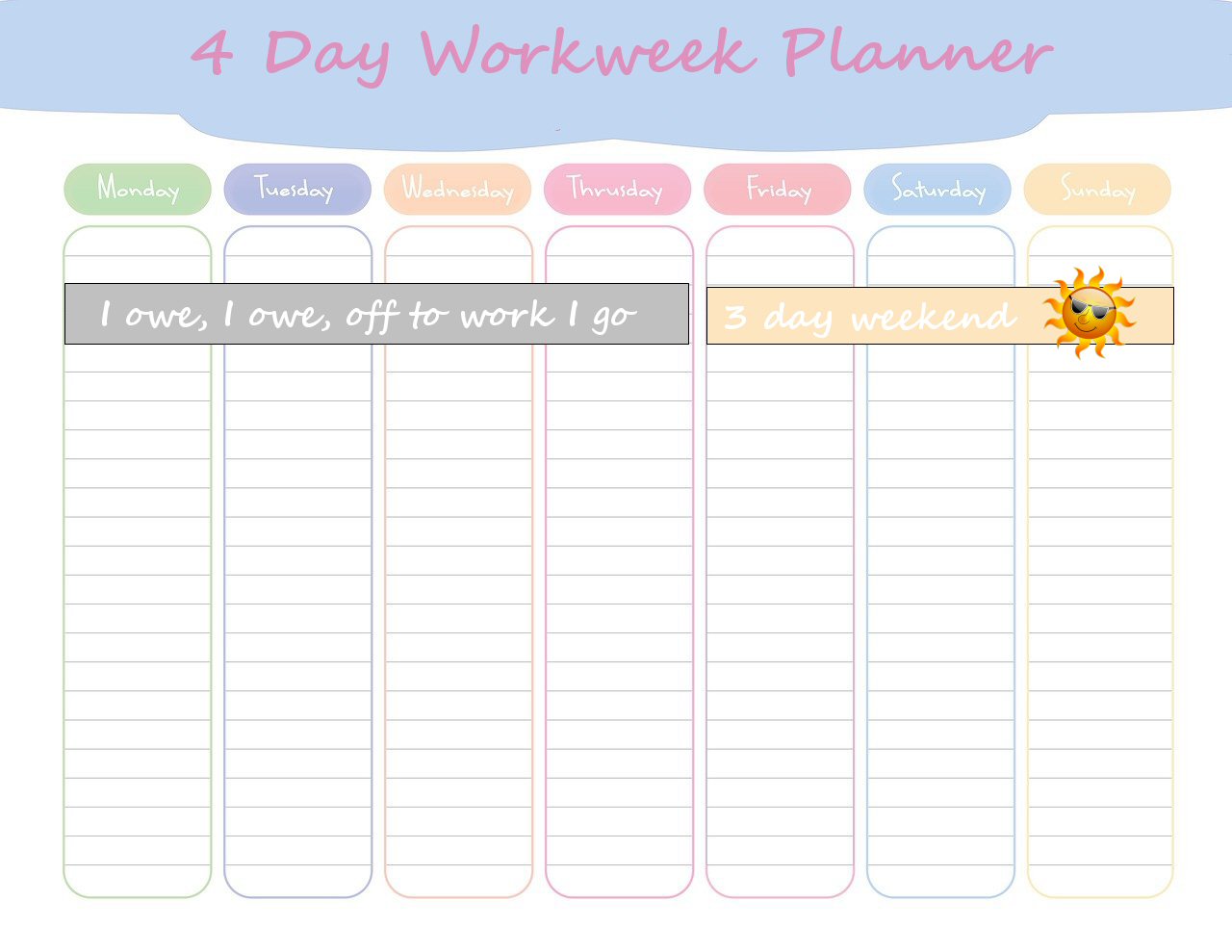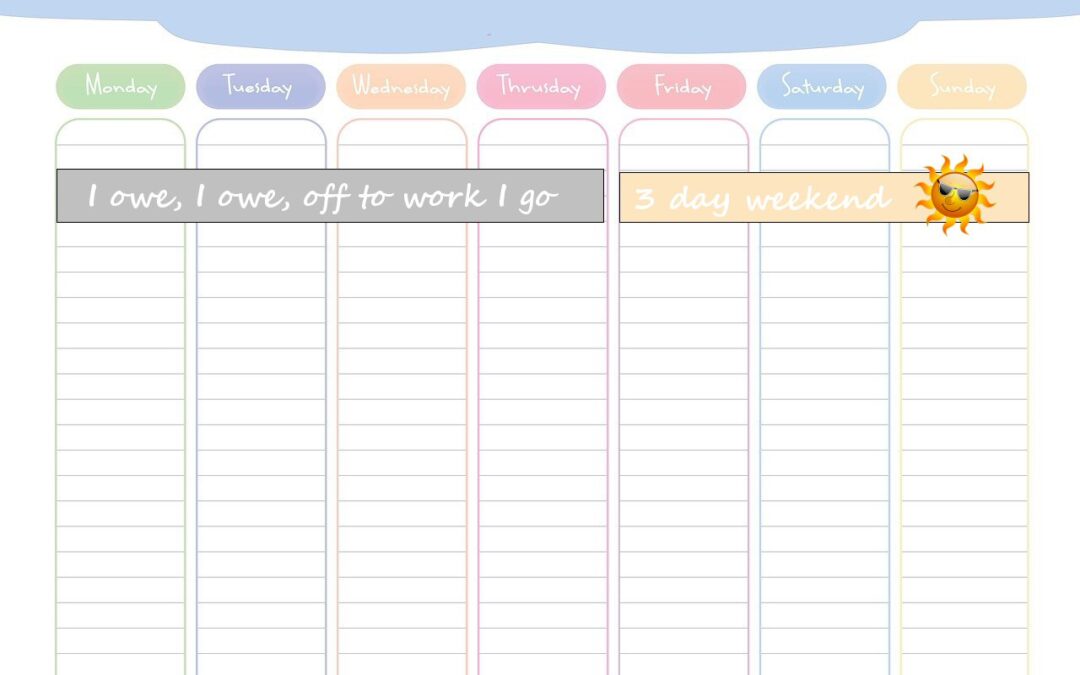The Four-Day Workweek: To Appease The Masses That Feel Overworked
The Four-Day Workweek: To Appease The Masses That Feel Overworked

The four-day workweek has been a hot topic of discussion recently, with more and more people feeling overworked and burnt out from their current work schedule. This concept involves reducing the traditional five-day workweek to four days, allowing employees an extra day for personal time or leisure activities.
Are we appealing to an overworked generation, or are they just lazy?
In 2016, millennials became the largest generation in the workforce; therefore, they will be a major factor in determining whether a four-day workweek will be a success. Millennials were born between 1981 and 1996.
There are many arguments for and against implementing a four-day workweek. Proponents claim it can improve work-life balance, reduce stress, and increase productivity. However, critics argue that this shift could lead to lower wages and reduced output. Whether this generation will take advantage of the benefits or see it as an excuse to slack off is yet to be seen. I feel you will have people in both camps. It’s the latter that scares me. I’m not a pessimist, but I base my thoughts on what the majority of the workforce is now and how I view this generation. When you hear things about Millenials like the ‘Me Generation‘ and ‘participation trophies,’ it’s hard not to think that some may take advantage of this opportunity. I wonder how many slackers there are and whether that percentage is the majority or minority. Time will tell if the four-day workweek becomes the norm.
What’s the logic?
All that work you feel you were doing for at least two people will now be backlogged because you need another personal day besides the traditional two-day weekend. To top it off, you want to get paid for a five-day workweek. Essentially, you’re just asking for another day off and be paid more to work less. For example, to keep the math simple, if you were to make $10 an hour and work 40 hours a week, you would make $400 a week. With the four-day workweek, while only working 32 hours, you will still make the same, but with fewer hours worked. This would evaluate you to a higher hourly wage. You’ll be making $12.50 an hour. A $2.50 raise that equates to a 25% on the upside. Wow, this surely would be the case of having your cake and eating it, too.
I can’t relate but there was a major event that I experienced while in the workforce back in the day. I felt it was a big boost, sort of like this 25% raise would be. The event was while working at Hewlett-Packard. Large raises were the norm early in my IT career. The HP Deferred Profit Sharing Plan gave out huge quarterly benefits. Then, on November 1, 1993, the HP Deferred Profit Sharing Plan was closed to new participants, and no further contributions were made after that date. Things started to go downhill from there, and 2-3% raises became the sign of the times for me right before the 2008 recession. With that said, the four-day workweek will be quite a difference-maker for this generation.
Benefits for Employers
While this may seem like a win-win situation for employees, there are also potential benefits for employers. Employers can save on overhead costs such as electricity and office supplies with a four-day workweek. Additionally, having a longer weekend could potentially boost employee morale and productivity during the week.
However, implementing a four-day workweek is not without its challenges.
- Maintaining the same output and productivity level with fewer working hours.
- Ensuring that all necessary tasks are completed within the shorter time frame.
- Scheduling conflicts.
These professions would find it difficult to maintain the same output and productivity level:
- Healthcare workers
- Retail workers
- Emergency responders
- Service industry employees
It could also create difficulties for businesses that rely on a five-day workweek:
- Restaurants
- Banks
- Other customer-facing businesses
Remote workers could benefit:
As remote work becomes the norm and more people turn to freelancing or starting their own businesses, the need for a traditional five-day workweek is slowly diminishing. The four-day workweek could be the solution to appease those who feel overworked and improve overall job satisfaction.
What about Mom-and-Pop Shops?
Mom-and-pop shops’ concerns are when they can’t afford to pay benefits but must have employees work a certain number of hours, so they are not considered part-time.
Will the law change to say 32 hours a week is full-time? If so, it could be beneficial for these businesses as they would only have to cover four days of wages instead of five. If not, it could decrease hiring as businesses struggle to afford the extra day’s wages and benefits.
Small businesses have few options. They can:
- Increase prices to cover the additional wages, leading to potential loss of customers.
- Cut employee benefits or hours could lead to decreased job satisfaction and retention.
- Cut the workforce to compensate for the extra day off.
- Be forced to shut down due to the additional costs.
Numerous studies have been conducted on the four-day workweek, with varying results.
- Some have shown that a shorter workweek can increase productivity and job satisfaction.
- Others have raised concerns about potential negative impacts on businesses and overall economic stability.
The Pros of a four-day workweek:
- Improved work-life balance: An extra day off gives employees more time to relax and recharge, leading to better mental and physical health. This could result in increased job satisfaction and reduced burnout.
- Increased productivity: A shorter workweek may motivate employees to get their tasks done efficiently before the long weekend. Additionally, having an extra day off allows them to tackle personal tasks and errands, freeing up their minds during work hours.
- Cost savings: With one less workday, companies can save on overhead costs such as electricity and heating, as well as expenses related to commuting.
- Environmental benefits: A four-day workweek could potentially reduce carbon emissions from transportation, as employees commute one less day per week.
The Cons of a four-day workweek:
- Longer workdays: Employees may have to work longer hours on their four working days to compensate for the lost workday. If this happens, employers will have to pay overtime, which could negate any potential cost savings.
- Scheduling conflicts: A shorter workweek may create scheduling conflicts with clients or customers who work on a traditional five-day schedule. This could result in reduced efficiency and potential lost business.
- Implementation challenges: Transitioning to a four-day workweek may come with its own challenges, such as reorganizing schedules and ensuring all necessary tasks are completed within the shorter timeframe. This could require additional resources and planning.
Is the four-day workweek feasible?
Yes, it is feasible. Eleven companies, including Amazon, Carfax, Microsoft, Panasonic, Samsung, and Toshiba, have implemented the four-day workweek. Legislation has also been introduced in the United States to implement it, each state with its own rules.
Implementing a four-day workweek may seem like an impossible idea for many companies. However, there are examples of businesses that have successfully made the switch and seen positive results. Let’s reference these two companies.
These companies implemented a four-day workweek and reported increases in productivity and job satisfaction among employees.
While it may not be feasible for all industries, the four-day workweek concept is gaining traction and sparking discussions about work-life balance, employee well-being, and overall workplace efficiency. As more people feel overworked and burnt out from their traditional work schedules, it’s worth considering alternative options that could benefit both employees and employers.
Perpetual Guardian
In 2018, New Zealand-based Perpetual Guardian implemented a four-day workweek for its employees without reducing pay. Work-life balance increased by 24%, from 54% to 78%. That leaves a minuscule percentage of 22% of employees who did not feel an improvement in work-life balance. Staff stress levels decreased by 7%, and overall life satisfaction increased by 5%. There was no decrease in productivity or revenue, leading the CEO to adopt the four-day workweek at Perpetual Guardian permanently.
Perpetual Guardian, specializing in trusts, wills, and estate planning, successfully trialed a four-day workweek. The trial, which took place in March and April of 2018, involved almost 250 staff members who worked four eight-hour days but were paid for five. The outcomes of this experiment were overwhelmingly positive, with employees reporting:
- Lower stress levels
- Higher job satisfaction
- Improved sense of work-life balance
Perpetual Guardian’s founder, Andrew Barnes, initiated the trial after noting his staff’s significant pressure balancing personal and professional responsibilities. He theorized that an extra day off might enhance focus and productivity at work, a hypothesis confirmed by data and anecdotal evidence gathered during the trial. Following the success of the trial, the company decided to adopt the four-day workweek full-time, offering flexibility for those who preferred traditional schedules to accommodate personal commitments like childcare or avoiding traffic congestion. Legal consultations ensured the new schedule complied with New Zealand employment laws and conditions.
Two New Zealand academics analyzed the trial’s findings, which showed a jump from 54% to 78% in employees feeling able to balance work and home commitments post-trial. Additionally, staff stress levels fell by seven percentage points, and measures of stimulation, commitment, empowerment at work, and overall life satisfaction all saw significant improvements. New Zealand’s workplace relations minister, Iain Lees-Galloway, found the results “very interesting” and expressed interest in working with businesses exploring new work models for the modern office.
Microsoft Japan
Microsoft Japan implemented a four-day workweek in August 2019, giving their employees Fridays off. The experiment saw productivity jump by a staggering 40%, with employees taking 25% fewer days off than the previous year and using 23% less electricity in the office.
The company also introduced other measures, such as shorter meetings or encouraging virtual communication rather than face-to-face meetings, to maximize the benefits of the shortened workweek. Employees reported increased satisfaction with their work-life balance, and 92% expressed positive opinions about the four-day workweek.
This experiment was part of Microsoft’s “Work-Life Choice Challenge Summer 2019” project, aimed at encouraging a healthier work environment for employees. The results reinforced the company’s belief that shorter working hours can lead to increased productivity and job satisfaction.
A Shift in Work Culture
A four-day workweek challenges the traditional 40-hour workweek, which has been the norm for decades. As society evolves and becomes more focused on work-life balance and employee well-being, it’s essential to consider alternative methods that allow employees to have a fulfilling personal life while still being productive at work.
Benefits of a Four-Day Work Week
While reducing the number of workdays may seem counterintuitive, many potential benefits come with implementing a four-day workweek. These include:
Improved Work-Life Balance
One of the main reasons for advocating a four-day workweek is to improve employees’ overall work-life balance. With longer weekends and an extra day off during the week, employees have more time to spend with family and friends, pursue hobbies or personal interests, and recharge their batteries.
Increased Productivity
Contrary to popular belief, working fewer hours does not necessarily lead to decreased productivity. Studies have shown that employees who work shorter weeks are often more productive during their working hours. With a shorter workweek, employees are more motivated to complete their tasks efficiently and make the most of their time at work.
Greater Job Satisfaction
A four-day workweek can also increase job satisfaction among employees. Having an extra day off during the week allows for better work-life balance, less stress, and more time for self-care. This can result in happier and more engaged employees, leading to a positive work environment and increased productivity.
Reduced Burnout and Employee Turnover
Long hours and high-stress levels can lead to employee burnout, resulting in high turnover rates. A four-day workweek helps reduce stress levels, providing employees with much-needed rest and time for personal commitments. This can lead to decreased burnout and employee turnover, ultimately benefiting the company’s bottom line.
Conclusion
The success stories of companies like Perpetual Guardian and Microsoft Japan demonstrate that a four-day workweek can be a viable option for businesses looking to improve employee well-being and productivity. As we continue to navigate the ever-changing landscape of work culture, it’s essential to consider alternative options that can benefit both employees and companies. Perhaps a four-day workweek could be the key to creating a healthier, happier, and more productive workforce. It’s not a one-size-fits-all solution, but it’s certainly an idea worth exploring and considering for the future of work.
I’m looking forward to hearing from you.
Thank you for reading.
The writings on this website are purely for your enjoyment. They are not intended to persuade, convince, or manipulate you into believing anything. I aim to provide informative and entertaining content to spark your interest and encourage you to continue learning various topics. I hope I have succeeded.


Written by Drean Martin
More From This Category
No Results Found
The page you requested could not be found. Try refining your search, or use the navigation above to locate the post.


0 Comments